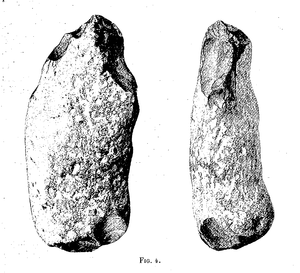What does eolith mean?
Definitions for eolith
ˈi ə lɪθeolith
This dictionary definitions page includes all the possible meanings, example usage and translations of the word eolith.
Princeton's WordNet
eolithnoun
a crude stone artifact (as a chipped flint); possibly the earliest tools
Wiktionary
eolithnoun
Crudely chopped flints, believed to be naturally produced by geological processes such as glaciation.
Etymology: From ἑός + λίθος.
Wikipedia
Eolith
An eolith (from Greek "eos", dawn, and "lithos", stone) is a knapped flint nodule. Eoliths were once thought to have been artifacts, the earliest stone tools, but are now believed to be geofacts (stone fragments produced by fully natural geological processes such as glaciation). The first eoliths were collected in Kent by Benjamin Harrison, an English amateur naturalist and archaeologist, in 1885 (though the name "eolith" was not coined until 1892, by J. Allen Browne). Harrison's discoveries were published by Sir Joseph Prestwich in 1891, and eoliths were generally accepted to have been crudely made tools, dating from the Pliocene. Further discoveries of eoliths in the early 20th century – in the Red Crag Formation and Norwich Crag Formation of East Anglia by J. Reid Moir and E. Ray Lankester and in continental Europe by Aimé Louis Rutot and H. Klaatsch – were taken to be evidence of human habitation of those areas before the oldest known fossils. The English finds helped to secure acceptance of the hoax remains of Piltdown man. Because eoliths were so crude, concern began to be raised that they were indistinguishable from the natural processes of erosion. Marcellin Boule, a French archaeologist, published an argument against the artifactual status of eoliths in 1905, and Samuel Hazzledine Warren provided confirmation of Boule's view after carrying out experiments on flints.Although the debate continued for about three decades, more and more evidence was discovered that suggested a purely natural origin for eoliths. This, together with the discovery of genuine early Lower Pleistocene Oldowan tools in East Africa, made support for the artifact theory difficult to sustain.
Wikidata
Eolith
An eolith is a chipped flint nodule. Eoliths were once thought to have been artifacts, the earliest stone tools, but are now believed to be naturally produced by geological processes such as glaciation. The first eoliths were collected in Kent by Benjamin Harrison, an amateur naturalist and archaeologist, in 1885. Harrison's discoveries were published by Sir Joseph Prestwich in 1891, and eoliths were generally accepted to have been crudely made tools, dating from the Pliocene. Further discoveries of eoliths in the early 20th century – in East Anglia by J. Reid Moir and in continental Europe by Aimé Louis Rutot and H. Klaatsch – were taken to be evidence of human habitation of those areas before the oldest known fossils. Indeed, the English finds helped to secure acceptance of the hoax remains of Piltdown man. Because eoliths were so crude, concern began to be raised that they were indistinguishable from the natural processes of erosion. Marcellin Boule, a French archaeologist, published an argument against the artifactual status of eoliths in 1905, and Samuel Hazzledine Warren provided confirmation of Boule's view after carrying out experiments on flints.
Matched Categories
Numerology
Chaldean Numerology
The numerical value of eolith in Chaldean Numerology is: 7
Pythagorean Numerology
The numerical value of eolith in Pythagorean Numerology is: 6
Translations for eolith
From our Multilingual Translation Dictionary
Get even more translations for eolith »
Translation
Find a translation for the eolith definition in other languages:
Select another language:
- - Select -
- 简体中文 (Chinese - Simplified)
- 繁體中文 (Chinese - Traditional)
- Español (Spanish)
- Esperanto (Esperanto)
- 日本語 (Japanese)
- Português (Portuguese)
- Deutsch (German)
- العربية (Arabic)
- Français (French)
- Русский (Russian)
- ಕನ್ನಡ (Kannada)
- 한국어 (Korean)
- עברית (Hebrew)
- Gaeilge (Irish)
- Українська (Ukrainian)
- اردو (Urdu)
- Magyar (Hungarian)
- मानक हिन्दी (Hindi)
- Indonesia (Indonesian)
- Italiano (Italian)
- தமிழ் (Tamil)
- Türkçe (Turkish)
- తెలుగు (Telugu)
- ภาษาไทย (Thai)
- Tiếng Việt (Vietnamese)
- Čeština (Czech)
- Polski (Polish)
- Bahasa Indonesia (Indonesian)
- Românește (Romanian)
- Nederlands (Dutch)
- Ελληνικά (Greek)
- Latinum (Latin)
- Svenska (Swedish)
- Dansk (Danish)
- Suomi (Finnish)
- فارسی (Persian)
- ייִדיש (Yiddish)
- հայերեն (Armenian)
- Norsk (Norwegian)
- English (English)
Word of the Day
Would you like us to send you a FREE new word definition delivered to your inbox daily?
Citation
Use the citation below to add this definition to your bibliography:
Style:MLAChicagoAPA
"eolith." Definitions.net. STANDS4 LLC, 2024. Web. 10 May 2024. <https://www.definitions.net/definition/eolith>.



Discuss these eolith definitions with the community:
Report Comment
We're doing our best to make sure our content is useful, accurate and safe.
If by any chance you spot an inappropriate comment while navigating through our website please use this form to let us know, and we'll take care of it shortly.
Attachment
You need to be logged in to favorite.
Log In